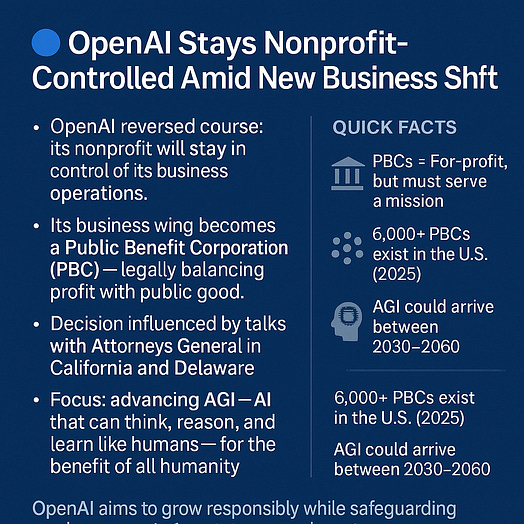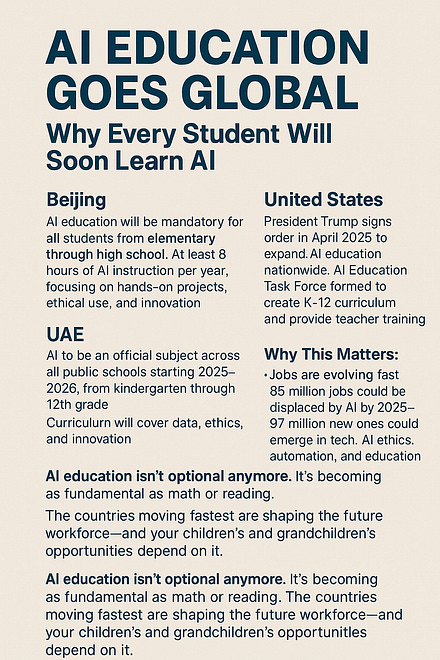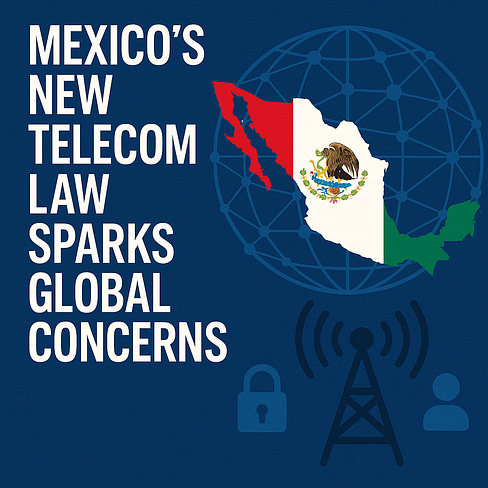Subscribe and do not miss the latest in AI and Tech. Plus, join our vibrant community. Hope you had a great weekend and are feeling refreshed to learn more and leverage the latest tech to boost your productivity. AI is going global, and it’s not just college graduates and workers who need to stay alert — parents must also take action to prepare the next generation for the future. Mexico is introducing new digital laws that could expand government control over citizens, and OpenAI will remain a nonprofit, but with a few structural changes. Let’s dive in.
OpenAI Reaffirms Nonprofit Control Amid Restructuring.OpenAI announced it will keep its nonprofit division in control of its business operations, reversing earlier plans to fully convert into a for-profit structure. Its business arm will transition into a Public Benefit Corporation (PBC), with the nonprofit retaining oversight and significant ownership. Founded as a nonprofit in 2015, OpenAI shifted to a "capped-profit" model in 2019, allowing investors limited returns. The recent decision comes after discussions with civic leaders and the Attorneys General of Delaware and California. Why it matters: 🧠 Learning Corner.Google AI Education: Offers a variety of free resources to learn about AI and machine learning AI Education Goes Global.Why Every Student Will Soon Learn AI.Artificial Intelligence is no longer just for tech labs and startups—it’s becoming part of everyday education worldwide. Beijing just announced that starting this fall, AI education will be mandatory for all students from elementary through high school. Every school must provide at least 8 hours of AI instruction per year, focusing on hands-on projects, ethical use, and AI innovation. This "teacher-student-machine" model aims to prepare over 2 million students in Beijing alone for an AI-driven future. Meanwhile, the UAE will introduce AI as an official subject across all public schools starting in 2025–2026, from kindergarten through 12th grade. Their curriculum, covering seven key areas including data, ethics, and innovation, is designed to build a future-ready workforce and support the UAE’s ambition to be a top global AI hub. In the United States, President Trump signed an executive order this April to expand AI education nationwide. A newly formed AI Education Task Force has 90 days to design a full action plan, which includes teacher training, K-12 curriculum updates, and AI literacy challenges. Federal grants will soon prioritize AI education, with public-private partnerships rolling out new resources to schools within 6 months.
📰 AI News and Trends
🌐 Other Tech news
What You Need to Know About Mexico's New Controversial Telecom LawMexico's recent proposed Telecommunications and Broadcasting Law has ignited intense debate, raising alarms over potential threats to digital freedom and human rights. Introduced by President Claudia Sheinbaum, the bill aims to replace the current legal framework, aligning the country with Industry 4.0, 5G, and IoT advancements. However, its fast-tracked legislative process and ambiguous provisions have drawn sharp criticism from civil society, experts, and opposition groups. Here's a breakdown of the key issues and why they matter. What's Changing? The law eliminates the autonomous Federal Telecommunications Institute (IFT), transferring its powers to the newly created Agency for Digital Transformation and Telecommunications (ATDT), a government-controlled entity. This shift centralizes authority, giving the Executive Branch significant control over spectrum allocation, concessions, and content oversight. The ATDT could block digital platforms without judicial oversight, a move critics warn could enable censorship. Additionally, the law mandates a "Communications and Equipment Registry" requiring telecom providers to collect detailed user data, raising privacy concerns. Why the Backlash? Civil society organizations, including Article 19 and R3D, argue the law's vague wording legalizes mass surveillance and prior censorship, violating constitutional and international human rights standards. The absence of clear criteria for blocking platforms could allow arbitrary shutdowns of social media or messaging apps, stifling free expression. The law also fails to ensure culturally and linguistically relevant communication for Indigenous communities, ignoring their hard-won rights and excluding them from decision-making on spectrum use in their territories. Critics highlight the lack of transparency in the legislative process, with the bill initially rushed through closed-door sessions, bypassing open parliamentary debate. Key concerns:
Why it matters: Bottom Line: 🧰 AI Tools
Download our list of 1000+ Tools for free. 🚀 Showcase Your Innovation in the Premier Tech and AI Newsletter (link) As a vanguard in the realm of technology and artificial intelligence, we pride ourselves in delivering cutting-edge insights, AI tools, and in-depth coverage of emerging technologies to over 55,000+ tech CEOs, managers, programmers, entrepreneurs, and enthusiasts. Our readers represent the brightest minds from industry giants such as Tesla, OpenAI, Samsung, IBM, NVIDIA, and countless others. Explore sponsorship possibilities and elevate your brand's presence in the world of tech and AI. Learn more about partnering with us. You’re a free subscriber to Yaro’s Newsletter. For the full experience, become a paying subscriber. Disclaimer: We do not give financial advice. Everything we share is the result of our research and our opinions. Please do your own research and make conscious decisions. |
Monday, May 5, 2025
✅OpenAI Reaffirms Nonprofit Control Amid Restructuring.
Subscribe to:
Post Comments (Atom)




No comments:
Post a Comment